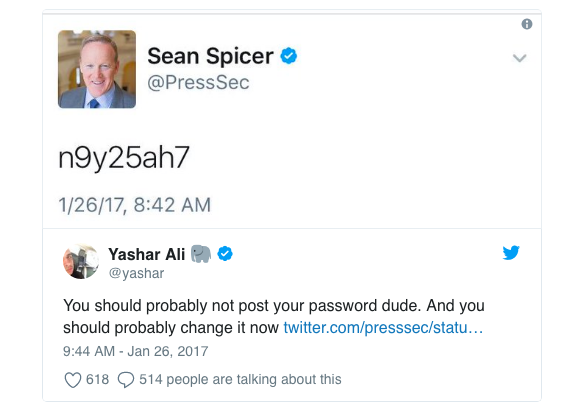Social media is used by many companies and leaders not only to promote brand awareness, but to promote themselves as well. Every leader has a certain image that they would like to portray online through the use of social media. The problem is, not all social media accounts are run by the leader specifically. Sometimes leaders hire people to create posts for them, which in turn can create a miscommunication and a misinformed image. Although, in some cases leaders will take charge of their own social media accounts and will not consult anyone before uploading their post. This can sometimes result in an uproar if the content of that post is offensive, or misguided. Social media is a strong tool when it comes to leadership, as it has the power to either strengthen or tarnish the reputation of a company. There are many reasons for social media fails when it comes to leadership, but the main reasons are due to outsourced leadership, failure to have posts reviewed beforehand, and in some cases having the account hacked.
The Rise of Social Media and Leadership
A main responsibility of being a leader in the twenty first century is having a social media presence. If a leader does not have a social media presence it is hard for them to communicate with their followers, and express their goals and accomplishments. Leaders are constantly updating their followers on what they are doing, or what their company is up to. Without a social media presence, leaders would have a harder time gaining popularity and having their beliefs and opinions heard.

Pablo Barbera (2018), the author of International Studies Quarterly discusses the rise of social media in leadership in saying, “Leaders themselves have signed up en masse and created their own social media accounts (on Twitter, YouTube, Facebook, etc.). By the end of 2014, more than 76 percent of world leaders had an active Twitter or Facebook account” (Barbera 2018). More than half of the world leaders in 2014 had an active Twitter or Facebook account. This proves that social media is on the rise when it comes to leadership, but how exactly they handle their social media account is up to them.
Outsourced Leadership
Putting trust in an employee to run a leader or company’s social media account can be very dangerous. Sometimes it can turn into a disaster if the employee is not educated enough on the subject matter. Quy Huy (2014) from the Harvard Business Review discusses outsourcing in saying, “Many companies tend to outsource community management to outsiders, which is a problem because the organization doesn’t learn and their communication doesn’t improve. This often results in the organization being different from the face it portrays online, which usually ends up getting discovered” (Huy 2014). Leaders need to be careful who they put their trust in when it comes to outsourcing. The leader needs to match the face it portrays online so that there are no discrepancies or social media mistakes.
Fox news Tweeted that President Donald Trump was spending his weekend in the Whitehouse when in fact he was actually on a golf trip all weekend (Leadem 2017). Their information was inaccurate which created an uproar from citizens.
A misinformed social media post could be the result of an inexperienced intern, although the leader is still responsible for that mistake.
Social Media Risks
There are many risks when it comes to social media, not only risks associated with outsourcing, but risks of private information unintentionally going public. Leaders need to be careful what they say and do on social media networks, as once private information goes viral, there is no going back.
Sean Spicer, the White House Communications Director, accidentally Tweeted his password to the public. With so many hackers, it is necessary to keep confidential information out of the publics reach (Leadem 2017).
Roland Deiser (2013) from McKinsey & Company discusses how dangerous social media can be when it comes to private information going viral in saying, “This radical change has created a dilemma for senior executives: while the potential of social media seems immense, the inherent risks create uncertainty and unease. By nature unbridled, these new communications media can let internal and privileged information suddenly go public virally” (Deiser 2013). There is so much uncertainty when it comes to social media that leaders need to handle their private accounts with delicacy.
One wrong word can create an uproar from followers, such as when Yahoo Finance accidentally said, “nigger”, instead of, “bigger”, in one of their Tweets about Donald Trump wanting a bigger navy (Leadem 2017).
Examples of Social Media Fails
Social media fails have been made by many leaders in the year of 2017 as seen in the Tweets of Donald Trump, CNN and even Mcdonalds. Social media is extremely useful to leaders, but it is also very risky and can result in major social media mistakes, as Rose Leadem (2017) expressed in her article on Entrepreneur.
Trump tweeted, “I am ‘honered’ to serve you…”, misspelling the word honored. This is a major mistake coming from the president of the United States. Some people might think, “if he can’t spell a simple word, how can people expect him to lead our country” (Leadem 2017)?
CNN also tweeted a photo of Faith Evans, but in the Tweet called her Faith Hill (Leadem 2017). Followers immediately recognized the difference and called them out on it.
One of the most shocking social media fails comes from one of America’s most well known companies, McDonalds. McDonalds Tweeted a nasty remark at president Donald Trump saying he is, “a disgusting excuse of a president”.
Although, it was determined that this Tweet was the result of a hacker. Kaya Yurieff from CNNTech wrote an article about McDonalds mistake and discussed their comment on the situation in saying, “‘Based on our investigation, we have determined that our Twitter account was hacked by an external source. We took swift action to secure it, and we apologize this tweet was sent through our corporate McDonald’s account,’ McDonald’s spokeswoman Terri Hickey said in a statement to CNNTech” (Yurieff 2017). A company’s social media sites should constantly be protected as hackers want to get attention and create chaos.
Leadership can be expressed through social media networks, but sometimes those networks can inhibit a leader. If leaders post unintentional, misinformed or private information on their social networking sites it could result in a lot of backlash. The risks of social media create uncertainty and unease and therefore should be handled delicately by leaders in order to avoid social media mistakes. Being a leader in the twenty first century, there is a need to constantly check social media posts before going public, because the smallest mistake could make a huge difference for the company.
References
Barbera, P., & Zeitzoff, T. (2018). The New Public Address System: Why Do World Leaders Adopt Social Media?. International Studies Quarterly, 62(1), 121-130. doi: 10.1093/isq/sqx047
Deiser, R., & Newton, S. (2013, February). Six Social-Media Skills Every Leader Needs. McKinsey & Company. Retrieved March 25, 2018, from https://www.mckinsey.com/ industries/high-tech/our-insights/six-social-media-skills-every-leader-needs
Huy, Q., & Shipilov, A. (2014, July 23). Social Media’s Leadership Challenges. Harvard Business Review. Retrieved March 24, 2018, from https://hbr.org/2010/11/social-medias- leadership-chall
Leadem, R. (2017, March 27). Biggest Social Media Fails of 2017. Retrieved April 10, 2018, from https://www.entrepreneur.com/slideshow/287469#0
Yurieff, K. (2017, March 17). McDonald’s: Anti-Trump tweet came from ‘compromised’ account. Retrieved April 10, 2018, from http://money.cnn.com/2017/03/16/technology/mcdonalds-trump-tweet/





